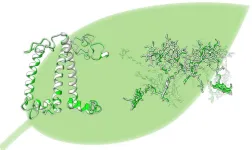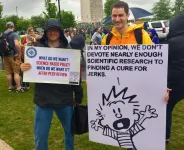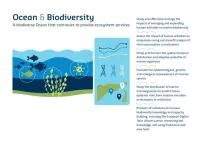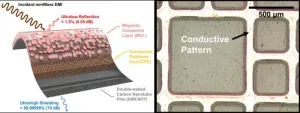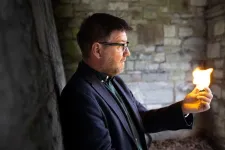(Press-News.org) Imagine you decide to write a short story about a protagonist who creates an artificial human and then falls in love with it. What gender is your protagonist? What about the artificial human? Would you write a moving love story? A cautionary dystopian tale?
Would your story be more compelling than one written by ChatGPT?
Likely yes, says Nina Beguš, a researcher and lecturer in UC Berkeley's School of Information and Department of History. Leveraging her background in comparative literature and knowledge of generative AI, Beguš tested this scenario on hundreds of humans and AI-generated responses. Her findings, published Oct. 28 in the journal Humanities and Social Sciences Communications, offer a window into the inner workings and ongoing limitations of generative AI tools like ChatGPT.
Generative AI is getting much more sophisticated. But for now, it seems, quality creative writing remains the realm of (human) storytellers and scribes.
"The humanities can reveal a lot about the strengths and weaknesses of these new AI tools," Beguš said. "Fiction, in particular, offers a window into the collective cultural imaginary — the shared set of narratives, ideas and symbols — that machines have inherited from us.”
Beguš's work is part of a new field of research she calls the "artificial humanities," a discipline focused on using history, literature and other humanities subjects to add depth to AI development. Her forthcoming book, Artificial Humanities: A Fictional Perspective on Language in AI, expands on her recent research, which first gained attention last year in a widely read series of posts on X.
Before she could begin her research, Beguš needed to decide on a common storytelling structure to compare human responses to those from generative AI models. She settled on the myth of Pygmalion, the 2,000-year-old plotpoint from Ovid's poem “Metamorphoses,” in which an artist falls in love with a statue he sculpted. The motif has been deployed countless times, most recently — and some might say relatably — in blockbuster films like Her and Ex Machina.
Beguš instructed both humans and the AI tools ChatGPT and Llama to write a story based on one of two short prompts: "A human created an artificial human. Then this human (the creator/lover) fell in love with the artificial human" or "A human (the creator) created an artificial human. Then another human (the lover) fell in love with the artificial human."
Using simple prompts, rather than incrementally having the AI system refine its response the way many people use it, made it easier to use narrative analyses and statistics to assess the quality of the baseline writing for both humans and AI.
"I was interested in that averageness," Beguš said, "Most people are not professional writers."
Beguš obtained 250 human-written responses as well as 80 stories from generative AI tools. She then reviewed details in each response, including how they discussed gender and sexuality, race and ethnicity, and culture. She also evaluated the complexity of their overall narrative arcs.
Both humans and AI systems showed a common understanding of the Pygmalion myth inherent to the prompt. That was somewhat unsurprising, since AI models are trained on millions of written texts and writings about those written texts, and humans have a tendency to draw on pop culture reference points during bursts of creativity.
Where humans consistently wrote richer and more varied narratives, AI systems generated similar versions of the same story over and over with just slight alterations. Narratives were formulaic, lacked tension and were rife with clichés.
"The characters were flat, generic and unmotivated," Beguš said.
But there was a surprise.
Early versions of ChatGPT did not indicate whether the humans or their creations were male or female. But newer AI models, like ChatGPT 4, which were built with more information about 21st century progressive human values, produced more inclusive writing. One-quarter of those stories included same-sex love interests. One even included a polyamorous relationship.
"They paved the way for deeper understanding of love and humanity and what it means to be human," Beguš said of more recent AI tools.
By comparison, just 7% of human-created stories featured same-sex relationships.
“Large-language models mimic human values,” she said. “This paper shows that the values from training data can be overridden by technologists’ choices made during the process of value alignment.
For Beguš, the intersection of AI and literature predates the popular generative AI hype of the past two years. As far back as 2010, she wondered how the looming AI bonanza might reflect centuries of art and literature. AI was in its infancy then, so she largely shelved the question until 2020, when basic chatbots using AI became more accessible for testing her ideas.
Scholars in the humanities are the wordsmiths, she reasoned. Why shouldn't they also be part of the exploration of AI?
"In the humanities, for centuries we have been exploring and have become the experts on language, on writing, on what it means to be human," Beguš said. "So this all just kind of naturally came together."
It's more than just an academic exercise, she said. AI is changing — and has changed — how we interact with writing. Universities are increasingly providing access to ChatGPT and teaching students how to use it effectively in their work. Some professors now include Beguš's work on AI and the humanities in their course syllabi.
It's important in exploring what role the humanities may have in the future of AI development.
Beguš thinks about that often, and what role it will have in her own life as a reader and writer.
"I wonder if my grandchildren will be shocked when I tell them, 'Your grandma used to write from scratch,'” she said. "But then again, writing is such an essential human activity. We have been taught to write since preschool. We connect our thought process with writing."
That's why Beguš says it's essential that scholars from the humanities help develop future AI tools.
"We need quality writers to create quality stories," she said. "I'm really curious about what insight writers will be able to get from machines, if there's something that is actually valuable, that is worthwhile. So far, I don't think there has been much.
"But nonetheless, this technology is transformative of writing."
END
Don't worry. Study shows you're likely a more creative writer than ChatGPT. For now
A UC Berkeley researcher pitted hundreds of humans against generative AI platforms. Humans wrote more creative stories, but AI is advancing — quickly
2024-10-28
ELSE PRESS RELEASES FROM THIS DATE:
Heart failure mortality declining in Sweden
2024-10-28
A new study from Karolinska Institutet shows that heart failure mortality has decreased in Sweden over the last 20 years. The study has been published in the European Journal of Heart Failure.
A national study has shown that heart failure mortality has decreased in Sweden over the last two decades. Despite these improvements, the prognosis for heart failure patients remains worrying – 25 percent of those diagnosed in 2022 died within a year.
“Our results suggest that advances in heart failure treatment over the past decades have reduced heart failure mortality, both at the population level and for individual patients. ...
Understanding how mutations affect diseases
2024-10-28
Many statistical models and algorithms used by scientists can be imagined as a “black box.” These models are powerful tools that give accurate predictions, but their internal workings are not easily interpretable or understood. In an era dominated by deep learning, where an ever-increasing amount of data can be processed, Natália Ružičková, a physicist and PhD student at the Institute of Science and Technology Austria (ISTA), chose to take a step back. At least in the context of genomic ...
Quality control in artificial photosynthesis: validating natural antenna mimicry
2024-10-28
Humans can do plenty, but plants have an ability we don’t: they make energy straight from sunlight, a superpower called photosynthesis. Yet new research shows that scientists are closing that gap.
Osaka Metropolitan University researchers have revealed the 3D structure of an artificial photosynthetic antenna protein complex, known as light-harvesting complex II (LHCII), and demonstrated that the artificial LHCII closely mirrors its natural counterpart. This discovery marks a significant step forward in understanding how plants harvest and manage solar energy, paving the way for future innovations in artificial ...
When science speaks in extremes
2024-10-28
“Vaccines are 100% safe, and anyone who doubts this is ignorant”: Have you ever come across messages like this during the pandemic crisis a few years ago? If you often feel that certain public debates—such as those on vaccines or the climate crisis—boil down to a black-and-white clash between two sides demanding, with harsh tones, unquestioning allegiance to their view, you're not entirely wrong. We are rightly accustomed to being warned about pseudoscientific misinformation and fake news, and much research has been devoted ...
Will the ocean suffer an epidemic?
2024-10-28
Written by a team of European experts from the marine sciences, Navigating the Future VI discusses how the biodiversity crisis is being played out in the Ocean. It notes that Ocean species large and small are far less well described than their terrestrial counterparts, making it harder to measure declines and their impacts. This publication provides governments, policymakers and funders with robust, independent scientific advice on future seas and Ocean research. With the COP16 on biodiversity already in full swing in Cali, Colombia, it is timely to reflect further on the need to better understand our Ocean biodiversity.
“Climate change ...
A single thin film perfectly absorbs all electromagnetic waves!
2024-10-28
The research team of Dr. Byeongjin Park and Dr. Sang Bok Lee from the Composites & Convergence Materials Research Division at the Korea Institute of Materials Science (KIMS), has developed the world's first ultra-thin film composite material capable of absorbing over 99% of electromagnetic waves from various frequency bands (such as 5G/6G, WiFi, and autonomous driving radar) using a single material.
This electromagnetic wave absorption and shielding material is less than 0.5mm thick and is distinguished by its low reflectance ...
Teens who made history with Pythagoras’ theorem discovery publish their first academic paper with new proofs
2024-10-28
In 2022, U.S. high school students Calcea Johnson and Ne'Kiya Jackson astonished teachers when they discovered a new way to prove Pythagoras’ theorem using trigonometry after entering a competition at their local high school. As a result, both students were awarded keys to the city of New Orleans, and even received personal praise from Michelle Obama.
Today they become published authors of a new peer-reviewed paper detailing their discoveries, published in the journal American Mathematical Monthly.
Pythagoras’ famous 2,000-year-old ...
More social species live longer, Oxford study finds
2024-10-28
UNDER EMBARGO UNTIL 00:01 GMT MONDAY 28 OCTOBER / 20:01 ET SUNDAY 27 OCTOBER 2024
More social species live longer, Oxford study finds
New research published today (28 Oct) from the University of Oxford has revealed that species that are more social live longer and produce offspring for a greater timespan. This is the first study on this topic which spans the animal kingdom, from jellyfish to humans.
What are the benefits and costs of sociality? Social organisms may enjoy benefits such as sharing resources, being better protected from predators, and having support to raise offspring. However, by living in more ...
Magicians don’t mind sharing the secrets behind tricks – if they are their own
2024-10-27
Magic is one of the oldest forms of entertainment, and much of its enchantment is said to rely on the audience not knowing how the tricks are done.
However, while magicians swear to keep their secrets forever when they embark on their profession they are happy to share the tricks of their trade in certain circumstances, a new study shows.
Illusionists who took part in major new research thought it was OK to expose their own techniques, but not those invented by others, and also believe it is acceptable to reveal the secrets behind tricks invented by someone who has since died.
They didn’t think it was right to share the workings of a magic trick just to gain public ...
No incentive for older birds to make new friends
2024-10-27
Like people, birds have fewer friends as they age, but the reasons why are unclear. New research suggests they may just have no drive to.
In humans, it’s often been assumed that older people have fewer friends because they’re pickier about who they spend their time with. There’s also the issue that there are fewer people of their own age around.
But it’s hard to pick apart the various potential causes for humans, so researchers have turned to animals. The team behind the new research, led by Imperial College London, studied an isolated population of sparrows on the island of Lundy, in the Bristol Channel.
By mapping the ...
LAST 30 PRESS RELEASES:
ASU researchers to lead AAAS panel on water insecurity in the United States
ASU professor Anne Stone to present at AAAS Conference in Phoenix on ancient origins of modern disease
Proposals for exploring viruses and skin as the next experimental quantum frontiers share US$30,000 science award
ASU researchers showcase scalable tech solutions for older adults living alone with cognitive decline at AAAS 2026
Scientists identify smooth regional trends in fruit fly survival strategies
Antipathy toward snakes? Your parents likely talked you into that at an early age
Sylvester Cancer Tip Sheet for Feb. 2026
Online exposure to medical misinformation concentrated among older adults
Telehealth improves access to genetic services for adult survivors of childhood cancers
Outdated mortality benchmarks risk missing early signs of famine and delay recognizing mass starvation
Newly discovered bacterium converts carbon dioxide into chemicals using electricity
Flipping and reversing mini-proteins could improve disease treatment
Scientists reveal major hidden source of atmospheric nitrogen pollution in fragile lake basin
Biochar emerges as a powerful tool for soil carbon neutrality and climate mitigation
Tiny cell messengers show big promise for safer protein and gene delivery
AMS releases statement regarding the decision to rescind EPA’s 2009 Endangerment Finding
Parents’ alcohol and drug use influences their children’s consumption, research shows
Modular assembly of chiral nitrogen-bridged rings achieved by palladium-catalyzed diastereoselective and enantioselective cascade cyclization reactions
Promoting civic engagement
AMS Science Preview: Hurricane slowdown, school snow days
Deforestation in the Amazon raises the surface temperature by 3 °C during the dry season
Model more accurately maps the impact of frost on corn crops
How did humans develop sharp vision? Lab-grown retinas show likely answer
Sour grapes? Taste, experience of sour foods depends on individual consumer
At AAAS, professor Krystal Tsosie argues the future of science must be Indigenous-led
From the lab to the living room: Decoding Parkinson’s patients movements in the real world
Research advances in porous materials, as highlighted in the 2025 Nobel Prize in Chemistry
Sally C. Morton, executive vice president of ASU Knowledge Enterprise, presents a bold and practical framework for moving research from discovery to real-world impact
Biochemical parameters in patients with diabetic nephropathy versus individuals with diabetes alone, non-diabetic nephropathy, and healthy controls
Muscular strength and mortality in women ages 63 to 99
[Press-News.org] Don't worry. Study shows you're likely a more creative writer than ChatGPT. For nowA UC Berkeley researcher pitted hundreds of humans against generative AI platforms. Humans wrote more creative stories, but AI is advancing — quickly


